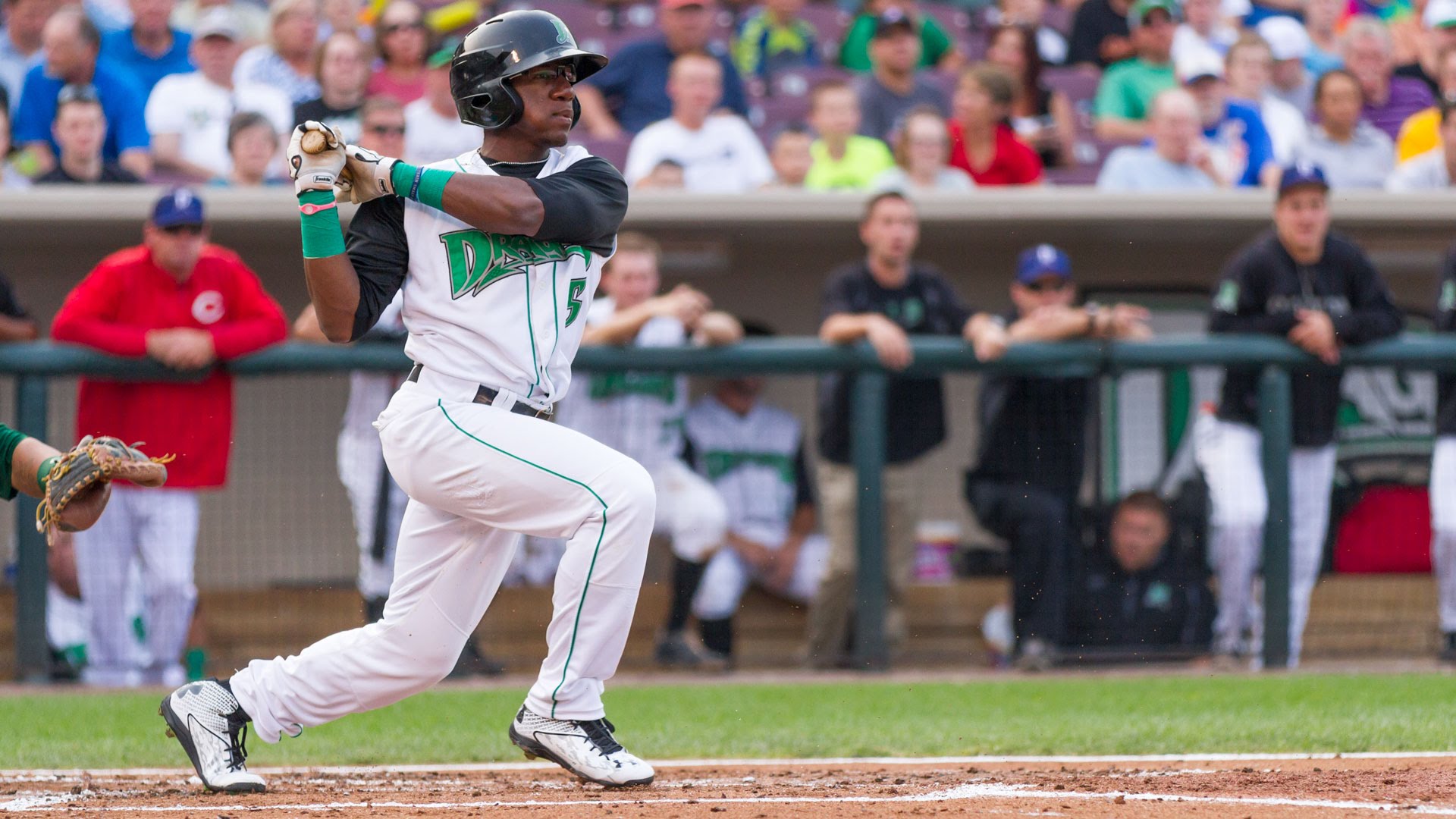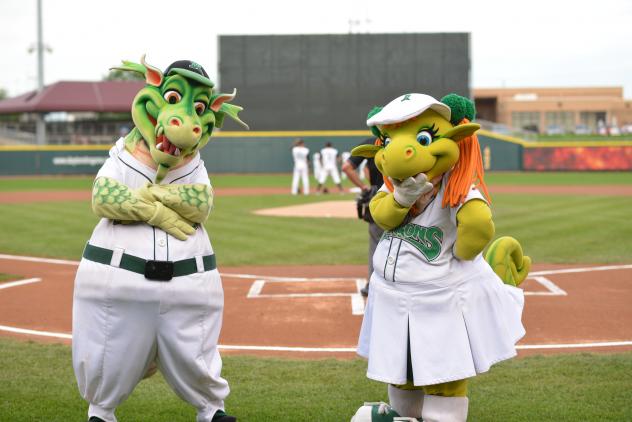If you’ve lived in Dayton for more than a year, than you’ve most likely heard of the Dayton Dragons baseball team. They are synonymous with Dayton, and have been a staple of Fifth Third field since 2000.
Yet the Dragons weren’t always the Dragons, and weren’t always housed in the Gem City. They started out in Rockford, IL in 1988 and played at Marinelli Field. They underwent several name changes throughout their time starting, as the Rockford Expos until 1992, then the Royals for two years, the Cubbies from 1995 to 1998 and settled for the Rockford Reds in their final year before being sold.
The team plays in the Eastern Division of the Midwest League. The Midwest League is a Class A minor league that plays a full season. Most players in the league are in their second or third professional season.
The Dragons play as a minor league affiliate of major league team the Cincinnati Reds.
The biggest claim to fame the team has is their marketability and ability to sell out games. Since the move to Dayton in 2000, the team has sold out every game held at the stadium.
Tom Nichols, the Dragons’ Director of Media Relations and Broadcasting, expands on the definition of a sellout in an interview with Flyer News:
“The definition of a sellout here means that every seat was sold… it’s the number of seats in the ballpark and all were sold–that would define a sellout. It also doesn’t have anything to do with how many people actually show up for the game. We could have a sellout and the place would be totally empty if every seat was sold and no one showed up,” Nichols said.
In 2011, they broke the record for the most consecutive sellouts by a professional sports team with 815, breaking the record previously held by the Portland Trail Blazers basketball team from 1977 to 1995.
 The streak then reached the 1,000 consecutive sellout marker on May 10, 2014. After the 2017 season, the streak still continues and is an all time professional sports record in North America and sits at 1,246 consecutive sellout games. The official website for the team states that every game in its 17 year existence has been a sellout.
The streak then reached the 1,000 consecutive sellout marker on May 10, 2014. After the 2017 season, the streak still continues and is an all time professional sports record in North America and sits at 1,246 consecutive sellout games. The official website for the team states that every game in its 17 year existence has been a sellout.
The Dragons also have the record for the biggest Minor League Baseball Class-A single season attendance record. They first set it in their inaugural 2000 season with 581,853 fans.
They broke the record again in the 2003 and 2004 seasons. Then in 2010 they broke their own record for a third time, housing 597,433 fans during that season.
One thing that contributes to the records and success of the franchise is the family friendly atmosphere created with the addition of entertainment.
The main mascots are two dragons, Heater and Gem, who always make goofy entrances in the start of a season. Sometimes entering Fifth Third by helicopter, performing jumps on a motorcycle, riding in on an Arabian horse and by driving a monster truck into the stadium.
Fun fact: Heater is actually Gem’s uncle, and not a couple as some may assume.
Another mascot for the team is a superhero called Roofman, who hangs out on the roof of Fifth Third, collecting foul balls that land there and transforming them into softee balls that get thrown back into the stands.
There are also several breaks in the action, with groups of kids singing songs, performing skits and contests for fans to participate in, a practice that is not common in the major leagues.
These kids are called the Green Team, and practice their performances before every game.
“Each night they get on the field for an hour or so and run through all that,” Nichols said. “It’s sort of aimed at that Disney style of production. We want everyone that comes in here to feel like they’re in a first class, first-rate event.”
The entertainment factor keeps things interesting for both fans of the game and non-fans, and can be attributed to the Dragons’ success.
“Until people come here and experience it, they don’t understand it,” Robert Murphy, president and general manager of the team, said in an interview with Bleacher Report. “It’s why I always hear people saying, ‘My wife hates sports, but she loves coming to Dragons games.'”
Another aspect of the Dragons that keeps the fans coming is the way they treat the community and involve them in games.
“You can’t just run a baseball team, you have to stay connected with the community,” Nichols said. “We have something called a Classroom MVP program where players go out to classrooms and speak to fourth and fifth grade classes. We have a number of military appreciation nights that involve the local Air Force Base. We have a number of what we call Community All Stars… where we honor people in the community who did something heroic.”
An interesting stat brought up by Nichols is the amount of tickets sold before the season begins. Over 90 percent of the tickets sold are season holder tickets and group packages even before the season begins.
 Yet there are usually plenty of tickets available on game night, since each player gets an allotted number of tickets for themselves, and not all players use them.
Yet there are usually plenty of tickets available on game night, since each player gets an allotted number of tickets for themselves, and not all players use them.
The team also makes many attempts to keep advertisements and attempts to sell things to fans at a minimum. They limit the amount of advertising at games, and don’t sell sponsors for the in-game entertainment.
“We don’t do things in front of our fans because people pay us to do them,” Murphy said. “Some teams feel it’s their God-given right to subject people to whatever someone pays them to say. We don’t want to do that. It’s a pure entertainment experience, and we thought there would be coordination between season-ticket renewals and people having a great experience.”
One thing the Dragons are not about is championship level baseball. The team has never made to a league championship game, and have only made seven trips to the league semifinals out of 18 seasons. The team has an unimpressive all-time record of 1,182 wins and 1,321 losses, and also having two 90 loss seasons.
However, this is due to the nature of how the team is structured, as all players are selected and moved around to other teams by their affiliate Cincinnati Reds. The team is treated more like a training ground for MLB players, and winning games isn’t a major goal. In it’s 18 seasons of existence, 91 Dragons have gone on to play for major league teams, with ‘03-04 player Joey Votto being the most notable example.
Regardless, the Dayton Dragons are still a staple of the Gem City, and a ticket to a game is still a hot commodity. The reason for the success comes down to many things: a prime location that was expanded at the right time, family friendly entertainment that appeals to non-fans, affordable prices and an atmosphere that treats the fans as a valuable piece of the team’s success.
Whatever the reason may be, you can’t go through the Gem City without hearing about the Dragons, and it is considered a necessary experience for anyone who wants to see all that Dayton has to offer.
Henry Wolski
Executive Editor


